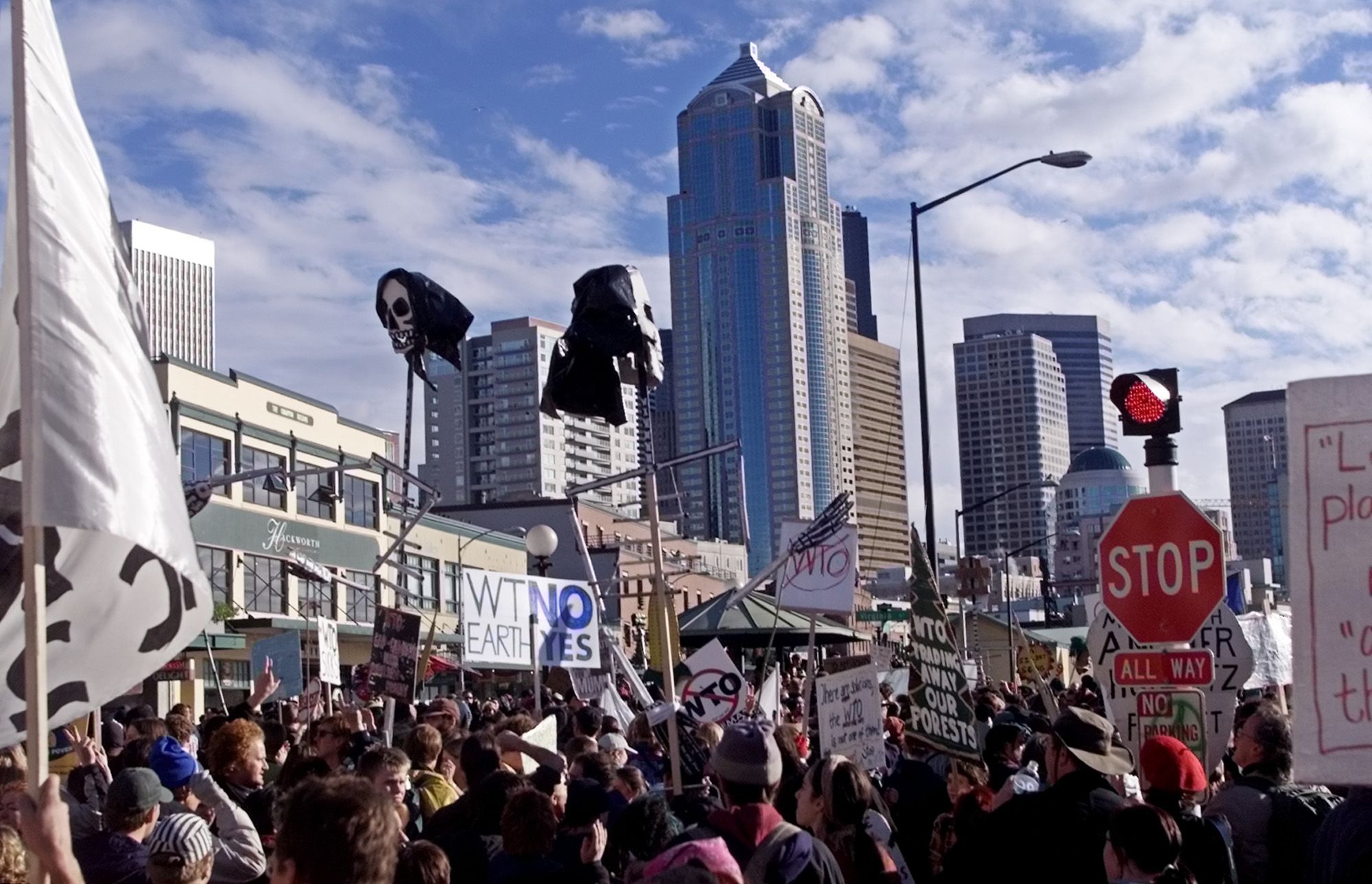Multilateral trade policy
 ©
Beth A. Keiser/Keystone
©
Beth A. Keiser/Keystone
Following the eight negotiation cycles that have taken place since the Second World War, international trade has undergone massive liberalisation. The last highly successful negotiations were held in the framework of the Uruguay Round from 1986 to 1994. They paved the way for the creation of the WTO in 1995 (the GATT was the previous institutional framework).
This initiated an important extension to the scope of application for global trade rules that had previously been limited to trade in goods. Since then, trade in services (GATS), intellectual property (TRIPS) and agricultural produce (AoA) have also been regulated. The intensive lobbying by major international corporations has played a decisive role in this process, as was clearly explained in the Public Eye document called ‘Machthungrige Strippenzieher’ (‘The power-hungry puppeteers’).
The World Trade Organisation (WTO)
The WTO represents the institutional and legal foundation of the multilateral trade system. It has a dispute resolution body for trade disputes. The rulings it hands out are binding and can impose painful sanctions.
The organisation aims to liberalise international trade and, the organisation is the driving force behind economic globalisation. Global trade barriers should be removed to achieve this goal. This includes tariffs, restrictions on imports, export subsidies and further applicable border protection measures that serve as barriers to trade.
The main idea behind this is the equal treatment of all members. The WTO follows two principles in this regard: ‘national treatment’ and the ‘most-favoured nation’. The first states that foreign economic actors should be subject to the same legislation as domestic actors in domestic markets. The second principle seeks to ensure that trade benefits (e.g. reduced tariffs) are offered to all WTO members rather than individuals. There are various exceptions to these rules however, meaning that free trade agreements or preferential trading agreements with the Global South comply with WTO standards to a greater or lesser extent.
The WTO establishes binding trade regulations for its members. These amount to a corpus of around 30,000 pages and are defined in 30 agreements. The four main agreements are the General Agreement on Trade and Tariffs (GATT), Trade-Related aspects of Intellectual Property Rights (TRIPS), the General Agreement on Trade and Services (GATS), and the Agreement on Agriculture (AoA).
The WTO: there is an urgent need for reform
Public Eye is a member of both the European and the international network of NGOs that are active in the field of trade policy. In Switzerland we demand a multilateral trading system that will allow each country the policy space needed to achieve self-determined development. This would enable countries to pursue independent industrial policies, create decent work, safeguard public services and improve national food security. Instead, the freedoms of individual countries are ever more restricted by WTO rules – policy instruments that the industrialised nations themselves used to apply successfully are thus denied to them.
The WTO must undergo fundamental change if this is to happen: it must become far more transparent and subscribe more strongly to democratic principles – and not only on paper. Moreover, the disproportionate negotiating power of industrial countries and the undue influence of multinational companies must be reduced. More important still is for the WTO to finally shift its ideology away from that of free trade in favour of sustainability, fairness, solidarity and respect for human rights.
It is doubtful that the WTO in its present form is capable of such fundamental reforms since it has long been in crisis. In addition to the blockade of its Court of Appeal, which has been ongoing for years, it is experiencing ever greater difficulties in concluding new multilateral agreements. More and more bilateral agreements are therefore being concluded, which is not in the spirit of the WTO, as bilateral FTAs undermine the WTO's central most-favoured-nation principle. The contracting parties grant each other preferential terms of trade, while all other countries are discriminated against.
Despite its criticism of the way the WTO currently works and its ideological orientation, Public Eye firmly supports the concept of a multilateral trading system with binding rules. For, especially for weaker countries, a regulatory framework of that nature is a pre-requisite to ensuring that the rule of the strong does not hold sway.
The Doha Round: no hint of a development round
Industrialised countries’ desire to increasingly liberalise global trade after the turn of the century initially ran into strong resistance from the Global South. It was only after the promise that the next round would be a ‘development round’, in which their needs and concerns would be central, that the developing countries agreed to take part in a new round of negotiations. Thus, the Doha Round was born.
Far from keeping their word, the industrialised countries continued to put their interests first, demanding that the countries of the South make the kinds of concessions that are incompatible with development. Led by Brazil, China and India in particular, the developing countries managed to resist the pressure placed upon them by the countries of the North. This effectively blocked the Doha negotiations. The industrialised countries stubbornly refused to honour the promises they had made poorer countries. Today, the so-called ‘development round’ is considered a failure – and symbolises the WTO’s unwillingness to agree on fair trade rules that benefit the Global South.

